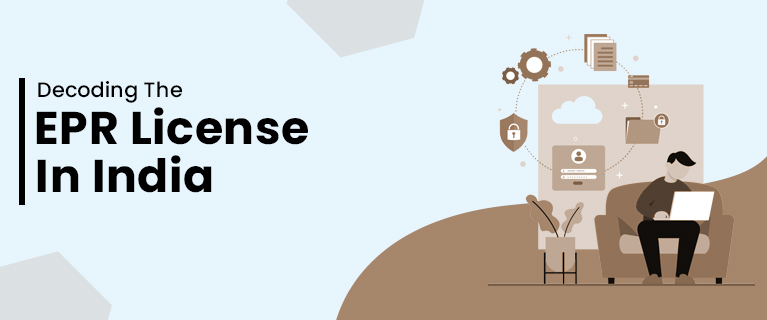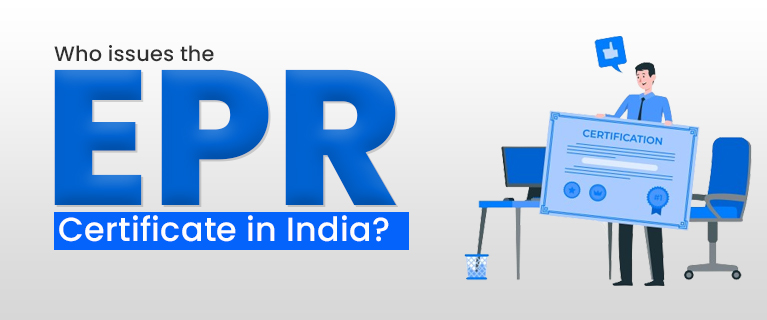Decoding The EPR License In India
In recent years, the growing concern for environmental sustainability and responsible waste management has led to the implementation of various measures to reduce the environmental impact of products throughout their lifecycle. One such significant measure is Extended Producer Responsibility (EPR). EPR is a policy approach that holds producers accountable for the environmental impacts of their products, especially after the products reach the end of their useful life. To ensure the effective implementation of EPR, producers are required to obtain an EPR License or register under the EPR Registration in India. This blog aims to decode the EPR License, exploring its significance, the required documents, and the procedure for obtaining it.
Understanding Extended Producer Responsibility (EPR)
Extended Producer Responsibility License is a concept that places the onus of managing post-consumer waste on the producers or manufacturers of products. It shifts the responsibility from consumers and municipalities to the producers, encouraging them to take proactive measures to manage the environmental impact of their products throughout their life cycle, including after they become waste.
The core principle of EPR Registration in India is to promote sustainable practices by incentivizing producers to design environmentally-friendly products, invest in recycling and waste management infrastructure, and ensure the safe disposal or recycling of products at the end of their life.
The Significance of EPR License in India
In India, the EPR License or EPR Registration in India is a legal requirement for producers to comply with the EPR provisions under various laws and regulations. It is an essential step for manufacturers, importers, and brand owners to demonstrate their commitment to environmental responsibility and sustainability.
The EPR License not only ensures compliance with environmental laws but also offers several other key benefits:
1. Environmental Stewardship: Obtaining the EPR License showcases a producer's commitment to environmental stewardship and responsible waste management. It reinforces their role as active participants in sustainable practices. Producers can implement efficient waste collection, sorting, and recycling programs to minimize the environmental impact of their products.
2. Compliance with Laws: EPR is now a mandatory requirement for certain product categories in India, such as electronics, plastic waste, and packaging materials. The EPR License ensures compliance with the relevant laws and regulations, preventing legal repercussions. Non-compliance may lead to penalties and sanctions, tarnishing a producer's reputation.
3. Brand Reputation: Implementing EPR practices and obtaining the EPR License can enhance a brand's reputation by positioning it as an environmentally responsible and socially conscious entity. It can attract environmentally conscious consumers and business partners, leading to increased customer loyalty and market competitiveness.
4. Resource Efficiency: EPR License encourages producers to adopt eco-friendly designs and sustainable production methods, leading to resource efficiency and reduced environmental impacts. By implementing measures to reduce waste generation and promote recycling, producers contribute to the conservation of natural resources.
5. Circular Economy: By taking responsibility for their products' end-of-life management, producers contribute to the development of a circular economy, where resources are reused, recycled, and remanufactured, reducing overall waste generation. This approach fosters economic growth while minimizing environmental degradation.
6. Cost Savings: Implementing EPR practices can lead to cost savings for producers in the long run. By incorporating design improvements for recyclability and resource efficiency, producers can optimise their manufacturing processes and reduce waste disposal costs.
7. Compliance with International Standards: As part of global efforts to address environmental challenges, adherence to EPR principles and obtaining the EPR License aligns producers with international environmental standards. This enhances India's reputation in the global market as a responsible and sustainable manufacturing hub.
8. Community Engagement: EPR initiatives often involve collaboration with local communities and waste management organizations. Producers can engage in community development projects, waste awareness programs, and skill development initiatives, fostering positive relationships with stakeholders.
Read Also This - How To Get EPR Certificate For Your E waste Management
The EPR License Documents and Procedure
Obtaining the EPR License involves a systematic process that requires specific documents and compliance with the regulatory guidelines. The procedure for obtaining the EPR License can be summarized as follows:
Step 1: Identify Applicability
Determine whether your product category falls under the ambit of EPR as per the relevant laws and notifications issued by the government. Conduct an in-depth analysis of the product's lifecycle, waste generation potential, and end-of-life management requirements.
Step 2: Choose the Appropriate Agency
Identify the appropriate authorized agency responsible for EPR compliance in your product category. Different agencies may oversee EPR for different product types, such as electronics, plastic waste, or packaging materials.
Step 3: Preparation of Documents
Gather the necessary documents required for EPR License application, including:
- Company registration documents: Provide valid proof of the company's legal existence and address.
- Product details and specifications: Clearly outline the product's technical specifications, components, and materials used.
- Environmental policy statement: Develop a comprehensive environmental policy that outlines the producer's commitment to sustainable practices and EPR compliance.
- Waste management plan: Present a detailed waste management plan, including strategies for waste collection, segregation, recycling, and safe disposal.
- Financial assurance documents (if required): Some product categories may require producers to furnish financial assurance to cover the costs of end-of-life management.
- Any other documents specified by the regulatory authorities: Stay updated on the specific requirements set by the designated agency for EPR License application.
Step 4: Application Submission
Prepare and submit the application for the EPR License to the designated agency responsible for overseeing EPR compliance in your product category. Ensure that all the required documents are properly filled, signed, and authenticated as per the agency's guidelines.
Step 5: Verification and Evaluation
After receiving the application, the designated agency will conduct a thorough verification and evaluation process. This may include reviewing the submitted documents, assessing the waste management plan, and evaluating the producer's commitment to EPR principles.
Step 6: Compliance Audit
In some cases, the agency may conduct an on-site compliance audit to verify the producer's waste management infrastructure, recycling facilities, and adherence to EPR guidelines. This audit is essential to ensure that the producer has the necessary resources and capabilities to implement effective EPR practices.
Step 7: Granting of EPR License
Upon successful verification and compliance audit, the designated agency will grant the EPR License to the producer. The EPR License will specify the terms and conditions for the producer's responsibilities and obligations related to waste management and environmental stewardship.
Step 8: Periodic Reporting and Renewal
Once the EPR License is granted, the producer must adhere to the stipulated reporting requirements, which may include periodic updates on waste collection, recycling volumes, and environmental performance. The EPR License typically has a validity period, and producers must ensure timely renewal to maintain compliance.
Read Also This - Challenges Of Extended Producer Responsibility (EPR) For Plastic Waste In India
The Significance of EPR License:
The EPR License holds significant importance for both producers and the environment. It serves as a vital tool in promoting sustainable business practices and ensuring responsible waste management. Some of the key aspects that highlight the significance of the EPR License are:
1. Environmental Protection: The EPR License places the responsibility for waste management on producers, encouraging them to adopt eco-friendly and resource-efficient practices. By ensuring proper disposal and recycling of products, the EPR License contributes to reducing pollution and conserving natural resources.
2. Circular Economy Promotion: EPR encourages the adoption of a circular economy model, where products are designed for reuse and recycling. By obtaining the EPR License, producers actively participate in the shift towards a more sustainable and waste-free economy.
3. Legal Compliance: Compliance with EPR regulations through obtaining the EPR License is a legal requirement in India. Non-compliance can result in penalties and sanctions, affecting a producer's reputation and business operations.
4. Consumer Confidence: EPR License demonstrates a producer's commitment to environmental responsibility and sustainable practices. Consumers are increasingly inclined to support brands that prioritise eco-friendly initiatives, leading to enhanced consumer confidence and brand loyalty.
5. Corporate Social Responsibility (CSR): By obtaining the EPR License and implementing responsible waste management practices, producers fulfil their CSR commitments towards the environment and society. EPR initiatives often involve community engagement and environmental awareness programs.
6. Market Competitiveness: In a rapidly evolving business landscape, sustainability is becoming a crucial factor for market competitiveness. Producers with the EPR License have a competitive advantage, as environmentally conscious consumers prefer products from responsible and eco-friendly brands.
7. Resource Conservation: Effective EPR practices promote the efficient use of resources and reduce waste generation. This contributes to conserving raw materials, energy, and water resources, leading to long-term sustainability.
8. Government Support: The Indian government encourages EPR implementation and offers support to producers through various incentives and initiatives. Obtaining the EPR License enables producers to access such support and participate in sustainable development programs.
Read Also This - Who Issues The EPR Registration Form In India
Conclusion
The EPR License plays a pivotal role in India's journey towards environmental sustainability and responsible waste management. It empowers producers to take ownership of their products' end-of-life management, promoting a circular economy and reducing environmental impacts. Through systematic compliance with EPR regulations and obtaining the EPR Registration in India, producers not only fulfil their legal obligations but also position themselves as responsible corporate citizens committed to environmental stewardship.
As EPR becomes an integral part of the business landscape, obtaining the EPR License is not just a legal requirement; it is a strategic decision that contributes to a cleaner and greener future for generations to come. Embracing the principles of EPR and obtaining the EPR License demonstrates a producer's commitment to environmental protection, resource conservation, and sustainable development. It is an opportunity for producers to be at the forefront of environmental responsibility and lead the way towards a more sustainable and eco-friendly economy.










